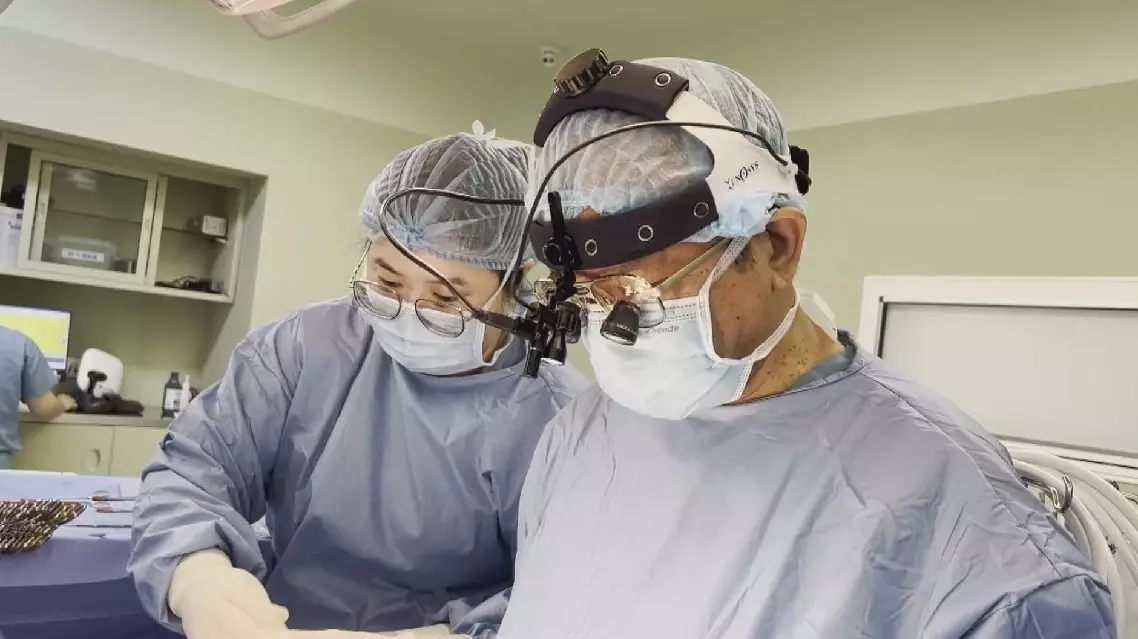Shanghai is collaborating with over 20 countries and regions to cultivate talents in the field of medicine, as part of its efforts to become a world-class hub for medicine and medical services.
Batsulen is a doctor from Mongolia. He is learning advanced coronary treatment techniques from cardiac surgery experts in Ruijin Hospital in Shanghai. He hopes that through his studies, he can master more new technologies and accumulate experience.
"In Mongolia, we have only one cardiac center and we usually do 300 open heart surgeries per year. In Ruijin Hospital, they do the same number of cases in a month," he said.
"Mongolian doctors also are actively participating in and studying the system building in the cardiovascular discipline. In this way, they can promote the development of local health care when they return home," said Zhao Qiang, vice president of Ruijin Hospital.
Bositkhon Kayumov, a student from Uzbekistan, is studying at the Shanghai University of Traditional Chinese Medicine as a graduate student. He is specializing in acupuncture and moxibustion-related treatment, including cupping and warming needle therapies.
He will graduate next year, and plans to open a clinic combining traditional Chinese and Western medicine for treatment of cervical and lumbar spine diseases.
"I want to take these mature traditional Chinese medical techniques back to Uzbekistan, so that the people of Uzbekistan will also benefit from such services," said Kayumov.
Shanghai aims to fully utilize both domestic and international markets and resources in the next five to ten years. It will better integrate the cross empowerment of multiple industries such as healthcare, insurance, and tourism – striving to make high-level technology and services an important feature of the city's branding as a medical world hub.

Shanghai cultivates medical talents from multiple countries
Macao has been emerging as a global hub for conventions and exhibitions in recent years by exploring the enormous opportunities in the sector, driving the region to advance its economic diversification and embrace a brighter future.
Macao has received many awards this year, such as the Best Convention City (Asia) and the Best BT-MICE City, showcasing the recognition for and influence of Macao's exhibition industry.
More than 1,000 electronic game enthusiasts from all over the world gathered recently in Macao to participate in a esports themed event.
Su Zhili, organizer of the event, said that Macao's rich experience in hosting large-scale events, coupled with its good infrastructure, has driven him to choose the region as an ideal destination to hold such an activity.
"Macao has held many similar large-scale events. It has rich experience, and the facilities at the venue are relatively mature, so we can start our work comfortably," said Su.
During the first three quarters of 2024, Macao held more than 1,000 conferences and exhibitions in total.
"We will invite more professional, special conferences to be held in Macao and also cultivate more exhibition brands with international influence in Macao, so as to promote Macao's exhibitions to be more market-oriented, professional, international, digital and greener from various aspects. This is our goal," said Elaine Wong, member of the Macao Commerce and Investment Promotion Institute.
In addition, multiple large exhibitions and conferences, such as the Macao International Trade and Investment fair, the Macao Franchise Expo, and the International Infrastructure Investment and Construction Forum, are held regularly in Macao.
With the introduction of a series of policies and measures to facilitate the exchanges between the mainland and Macao, as well as the construction and development of the Guangdong-Hong Kong-Macao Greater Bay Area and the Guangdong-Macao In-Depth Cooperation Zone in Hengqin, Macao's convention and exhibition industry will embrace more opportunities for development in the foreseeable future.
"We have such a good industrial base in the Greater Bay Area. The mode of 'Convention and Exhibition + Industry' not only integrates the industries of Macao, but also the industries of the Greater Bay Area. In addition, Macao actively integrates into the national development and plays a role in the Belt and Road. Why are we so confident in Macao's convention and exhibition sector? Because it is backed by the motherland, and the country gives Macao great support," said Alan Ho, chairman of the Macao Association of Convention, Exhibition and Tourism Sectors.

Macao emerges as global hub for conventions and exhibitions, driving economic diversification and international recognition










